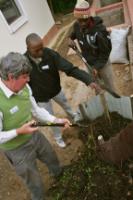
Yesterday, I spied Prof Rob O’Donoghue in the courtyard of the ELRC. His sleeves were rolled up to his elbows and his glasses perched on top of his head -- signals I know to mean he’s about to give a demonstration. You must know a few things about Prof Rob: he loves sustainable inventions and stand up comedy and he has been an educator for about 35 years. He has had a time to combine these interests and passions into his own well-honed brand of active workshop, which he performs to students, teachers, passersby -- basically anyone willing to listen. And by active demonstration I mean, digging holes, scooping grass, pulling weeds, planting trees.
Soon after I spotted Prof Rob, two youths arrived from Ward 7, Monwabisi Kilani and Sivelele Masa, his pupils for the day. The lesson began by moving a round piece of corrugated iron and wooden poles, a homemade compost. The contraption was basic, though revolutionary in its simplicity: easy to make, easy to move, inexpensive. It’s portability allowed for the compost to play a more dynamic role in a garden, conditioning a patch of ground, making it nutrient rich and soft for digging and planting, and then moving to another patch.
Though the centre supports educational aspects of environmental and sustainable development, which often means teaming with well-established organisations with the know-how and networks to affect policy and curriculum, this is just one sphere of influence. It supports ESD in other less formal, organised ways. The sustainable learning commons is the best expression of the centre’s commitment to partnering with locals -- regular people like Kilani and Masa -- asking them to share their experiences and to engage in mutual-learning from the academic research that is taking place.
Kilani and Masa not only took in the information from Prof Rob’s lesson, they were invited to pick up a pitch fork and shovel and participate.This exercise wasn’t about gaining abstract head-knowledge, but learning essential techniques that could be immediately applied. Kilani and Masa are a part of a self-initiated project in their community, Inqaba Yegolide Youth Cleaning Initiative. Along with eight of their peers, they hope to rid the streets of rubbish and encourage more sustainable environmental practices. Eventually, they intend to expand the project using various business models which will meet a need in their community (a day care centre, as Ward 7 is without) while generating income for the initiative. But for now, the aim is to start building composts for people, planting trees and collecting rubbish.
“We came to Prof Rob to learn,” says Kilani, “We are doing research about greening, and he showed us other greening initiatives.” Kilani explains that while they wait for their business certificate and for start-up capital from the Makana Municipality’s Economic and Social Development Office, they are gathering all the information they can on relevant environmental practices and running a sustainable business.
“When we get funds from Social Development we want to be the ones to do the work -- to get experience for the next 6-12 months about how to run a business and do these projects before we employ other people.”
